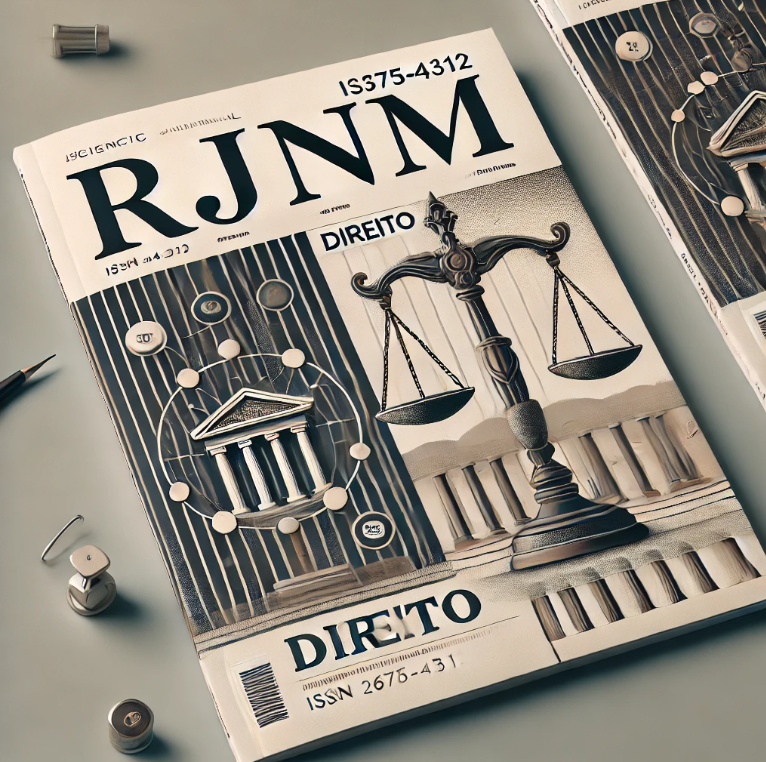A EVOLUÇÃO DO DIREITO INTERNACIONAL DOS DIREITOS HUMANOS E O COMBATE AO TRÁFICO PESSOAS NO BRASIL
DOI:
https://doi.org/10.61164/rjnm.v12i1.3042Abstract
This article aims to study the progress of Brazilian legislation regarding the prevention, combat, and assistance to victims of human trafficking. The methodology used in this article involved theoretical and documentary research related to the topic, including consultations with doctrine, case law, theses, dissertations, and reliable governmental and non-governmental websites. The research is guided by the following question: Can it be determined that there has been significant progress in International Human Rights Law in Brazil concerning the crime of human trafficking? The purpose of this article is to analyze the historical trajectory, concepts, and characteristics of the crime of human trafficking, as well as to study the social, economic, and cultural factors, and even the Covid-19 pandemic, that contribute to the increase in human trafficking victims. Human trafficking represents a severe violation of human rights, affecting millions of individuals worldwide. Advances in Brazilian and international legislation, such as Law No. 13.344/2016 and the Palermo Protocol, aim to combat trafficking and offer protection to victims. Factors such as social inequality, forced migration, and humanitarian crises fuel this practice, requiring effective public policies. Thus, legislative progress in addressing exploitations beyond sexual exploitation, coupled with international cooperation and support networks for victims, is crucial to eradicating trafficking and promoting a just future.
References
BRASIL. Decreto-lei 2848 (1940). Código Penal Brasileiro. Brasília, DF: Presidência da República [2024]. Disponível em: http://www.planalto.gov.br/ccivil_03/decreto-lei/del2848compilado.htm. Acesso em 01 set. 2024.
BRASIL. Decreto 5.017 (2004). Promulga o Protocolo Adicional à Convenção das Nações Unidas contra o Crime Organizado Transnacional Relativo à Prevenção, Repressão e Punição do Tráfico de Pessoas, em Especial Mulheres e Crianças. Brasília, DF: Presidência da República [2024]. Disponível em: http://www.planalto.gov.br/ccivil_03/_Ato2004-2006/2004/Decreto/D5017.htm. Acesso em 01 set. 2024.
BRASIL. Lei n° 11.106 (2005). Altera os arts. 148, 215, 216, 226, 227, 231 e acrescenta o art. 231-A ao Decreto-Lei nº 2.848, de 7 de dezembro de 1940 – Código Penal e dá outras providências. Brasília, DF: Presidência da República [2024]. Disponível em: https://www.planalto.gov.br/ccivil_03/_ato2004-2006/2005/lei/l11106.htm. Acesso em 01 set. 2024.
BRASIL. Lei 13.344 (2006). Dispõe sobre prevenção e repressão ao tráfico interno e internacional de pessoas e sobre medidas de atenção às vítimas. Brasília, DF: Presidência da República [2024]. Disponível em: http://www.planalto.gov.br/ccivil_03/_Ato2015-2018/2016/Lei/L13344.htm. Acesso em 01 set. 2024.
BRASIL. Decreto n° 4.388 (2002). Promulga o Estatuto de Roma do Tribunal Penal Internacional. Brasília, DF: Presidência da República [2024]. Disponível em: https://www.planalto.gov.br/ccivil_03/decreto/2002/d4388.htm. Acesso em 01 set. 2024.
BRASIL. Câmara dos Deputados. Legislação Informatizada – DECRETO-LEI N° 2.848, DE 7 DE DEZEMBRO DE 1940 – PUBLICAÇÃO ORIGINAL. Brasília, DF, 2024. Disponível em: https://www2.camara.leg.br/legin/fed/declei/1940-1949/decreto-lei-2848-7-dezembro-1940-412868-publicacaooriginal-1-pe.html. Acesso em 01 set. 2024.
BRASIL. Ministério da Justiça e Segurança Pública. Relatório Nacional sobre Tráfico de Pessoas: Dados 2017 a 2020. Escritório das Nações Unidas sobre Drogas e Crime; Ministério da Justiça e Segurança Pública, 2021. Disponível em: https://www.gov.br/mj/pt-br/assuntos/sua-protecao/trafico-de-pessoas/Dados%20e%20estatisticas/dados-e-estatisticas. Acesso em 01 set. 2024.
BRASIL. Ministério da Justiça e Segurança Pública. Relatório Nacional sobre Tráfico de Pessoas: Dados 2021 a 2023. Escritório das Nações Unidas sobre Drogas e Crime; Ministério da Justiça e Segurança Pública, 2024. Disponível em: https://www.gov.br/mj/pt-br/assuntos/sua-protecao/trafico-de-pessoas/relatorio-nacional-trafico-de-pessoas-oficial.pdf. Acesso em 01 set. 2024.
FILHO, Adolfo Borges. A Importância da Criação de um Estatuto do Tráfico de Pessoas na Legislação Brasileira. Revista do Ministério Público do Rio de Janeiro n° 58, Rio de Janeiro, p. 17-28, out./dez. 2015. Disponível em: https://www.mprj.mp.br/documents/20184/1278014/Adolfo_Borges_Filho.pdf. Acesso em 01 set. 2024.
MASSON, Cleber. Direito penal: parte especial: arts. 121 a 212 / Cleber Masson. 11. ed. rev., atual. e ampl. Rio de Janeiro: Forense, São Paulo: MÉTODO, 2018.
OROPEZA, Valentina. Quais países da América Latina recebem mais Venezuelanos – e porque há temor de nova onda. BBC NEWS, 18 agosto 2024. Disponível em: https://www.bbc.com/portuguese/articles/c8xl4rp2eplo#:~:text=A%20Col%C3%B4mbia%20%C3%A9%20o%20pa%C3%ADs,mais%20de%20568%20mil%20pessoas. Acesso em 01 set. 2024.
THE EXODUS ROAD. The Exodus Road Teoria da Mudança e Estratégia de Cinco Anos. Disponível em: https://theexodusroad-com.translate.goog/pt/theory-of-change/?_x_tr_sl=en&_x_tr_tl=pt&_x_tr_hl=pt-BR&_x_tr_pto=sc#tab_63c4324be9db2. Acesso em 11 out 2024.
Downloads
Published
How to Cite
Issue
Section
License
Copyright (c) 2024 Revista Jurídica do Nordeste Mineiro

This work is licensed under a Creative Commons Attribution-NonCommercial-ShareAlike 4.0 International License.







